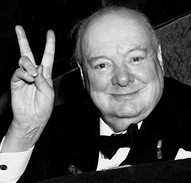weekly column
|
Each week, find a commentary on something connected to verses of Torah or another source of wisdom
|
|
Each week, find a commentary on something connected to verses of Torah or another source of wisdom
|
 We take smug satisfaction in Winston Churchill’s famous critique of democracy – it is the second-worst form of government after everything else. We also like to think that democracy works because of an informed electorate, in spite of evidence to the contrary. This election cycle has upended a lot of things, and it could be that our infatuation with democracy could be one of the casualties. I am guessing that rabbis all over the United States will be talking about Donald Trump this week that we read in synagogue about the populist rabble-rousing of Korach. Whether they support him or revile him, the comparisons are enticing. I want to look at the same story, but from a different perspective. But first…what form of government is suggested by the Torah? If you said democracy, you would be wrong. At this point in Numbers, some form of theocratic patriarchy is the only kind of governance imagined. Both on the “federal” level – Moses – and on the “state” level – the twelve tribes – one person has been appointed to carry out God’s will. The “judiciary” – the priesthood – is also in the hands of a divinely-designated functionary whose directed offspring will inherit his mantle. Somewhat grudgingly, God acknowledges that another form of government might emerge, though it isn’t recommended. That would be the monarchy. (Just for the record, it didn’t work out so well.) Democracy can be kvetched out of later teachings of ancient rabbis, but only by expanding on their creative interpretation of a verse (Exodus 23:2) that actually warns against majority-rule. And even in confirming a sort of majoritarian approach to Jewish law, their electorate is composed only of the educated elite (one rabbi, one vote). However, there is a moment that foreshadows democracy and its dangers. The result is in the story of the rebellion of Korach (Numbers 16), but the story begins five chapters earlier when God responds to Moses’s meltdown by telling him to gather a sort of representative body of leaders to share the gift of inspiration and authority. The number given is 70, which probably shouldn’t be understood too literally. But the number we should take seriously is two – the two guys who were not interested in a life of public service, Eldad and Meidad. They declined to show up for the initiation, but God’s spirit entered them anyway, in the midst of their everyday routine. Seized with prophetic ecstasy, they circulated among the people sharing their insights. Joshua, aide-de-camp to Moses, rushes to report to his boss this breach of protocol, and Moses makes a statement that will haunt him twice: “Would that all of the Lord’s people were prophets, and that the Lord would put the divine spirit upon them!” I imagine that expression of personal humility was reported quickly and widely by word of mouth (who needs Twitter?). Maybe the wagon-driver and the nursemaid didn’t dream of being as close to God’s will as Moses, but his brother and sister do. Pretty soon (well, a few verses later in 12:2), Aaron and Miriam are claiming that they, too, have encountered God and ought to enjoy Moses’s prominence. (In another precursor to American politics, they attempt to introduce race and sexual conduct into the critique of their brother.) God steps in on behalf of Moses and punishes Miriam for denigrating him (not Aaron, but that’s a different column). But what God does not do is suggest that the offenders do not legitimately encounter God. Don’t think that wasn’t lost on the people. And now back to our regularly scheduled story. What does Korach claim in his grab or power? “All the congregation is holy, every one of them, and God is among them!” The two-hundred-fifty or so members of the junta probably solemnly nodded their heads (or whatever people did back then) in agreement because Moses and Aaron had both affirmed the possibility and desirability of that claim. Mind you, this is no election. Most of the people seemed to have a willingness to follow the winner of the contest between Moses and Korach, which Moses wins definitively when Korach is swallowed by the ground and his entourage is consumed by fire. But the seed of political equality that was planted by this sequence was not from a disreputable source. Moreover, it was consistent with the egalitarian story of human origins that opens the Torah. The principle of democracy can be derived from this unpleasant interlude in the history of our people. But we make a mistake if we believe that, endowed as we are with decision-making capability, the proper determinant of casting a vote is merely personal preference or self-interest. The cynicism of campaigns directs attention at winning the vote by appealing to those self-centered motives. It deflects attention from choosing the better leader. The ground will not open if we choose wrongly, and people who squander their chance to chart the course of the nation on mere party loyalty or personal dismay will live to vote again. So it is worth spending the time listening for that spirit of discernment that gives us our authority to choose wisely. Voting on principle is the second-worst reason to cast a ballot.
0 Comments
Leave a Reply. |
Archives
October 2023
Categories |